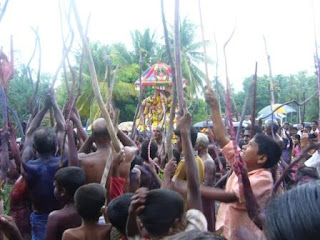The Dynamics of People Theatre for Social Change:
A Study of Selected Cultural Movements in Sri LankaNovita DewiGraduate Program of English Language Studies
Sanata Dharma University, Yogyakarta, Indonesia
The Third Eye Local Knowledge and Skills Activist Group. Called Moondravathu Kann [Third Eye] in Tamil, the man behind the group is an academic at the Eastern University of Sri Lanka Sivagnanam Jeyasankar. Himself a skilled kooththu performer, Jeyasankar has challenged the conventional, intellectual method –property of the academia– of performing arts by exploring the creative potential of the village performers.
He attempts to translate the community’s needs to flock, play and learn together, believing that such is important in today’s world where globalization continues to bulldoze the significance of communal life.
In 2002, he established the Third Eye Local Knowledge and Skills Activist Group (henceforth Thirdeye) with the aim to reformulate the traditional Tamil kooththu by engaging in participatory, applied and street theatre forms with children and youth.
It is an art medium to re-invigorate and celebrate the local knowledge, skills and traditions of villages in Batticaloa. The kooththu players together with the youth create performance pieces, facilitate children’s drama and games workshops as well as organise children’s performances.
Different group members coordinate and specialise in different activities depending upon their skills and training. Ethnic conflict and the 2004 tsunami are among topics discussed and performed by the group.
Although at this writing, Jeyasankar is completing his Doctorate in India, Thirdeye remains active in their cultural activities such as publishing poetry, and organising events and workshops pertaining to gender, violence and various awareness training.













































